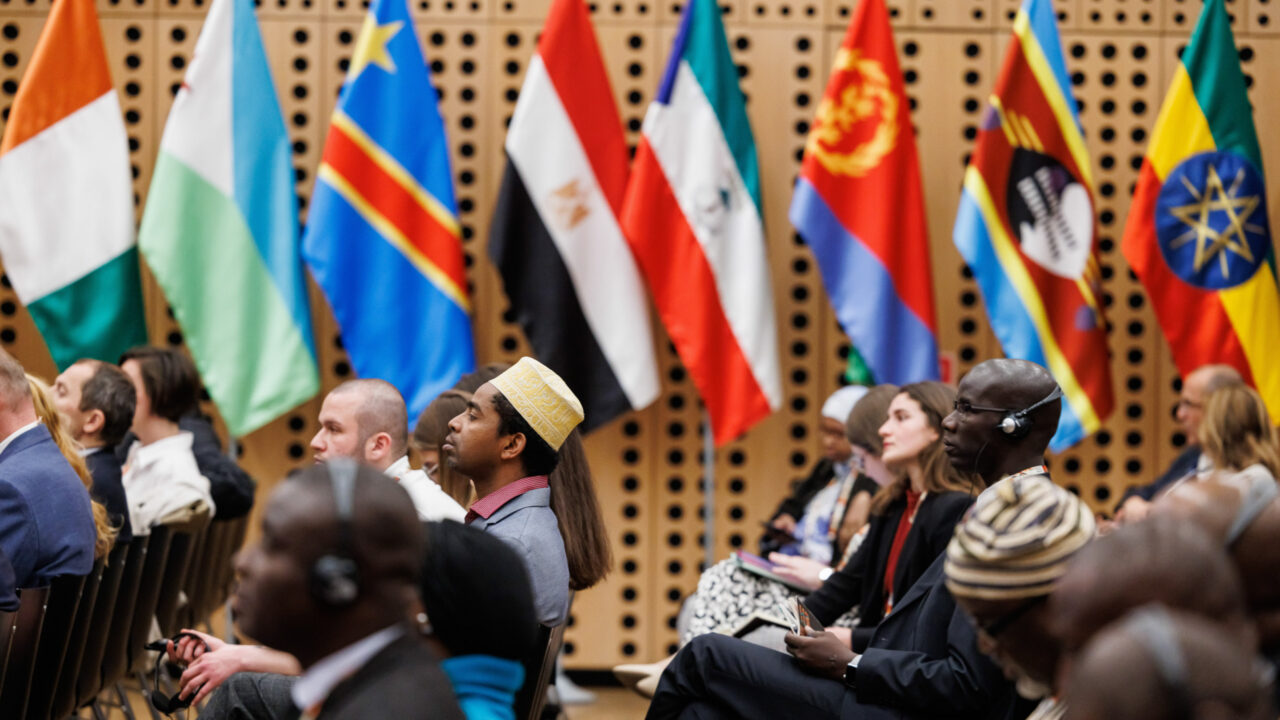Multilateral climate: How Europeans can cure planet Earth’s blues
The EU still needs traditional multilateral forums to fight climate change. But it also needs to strengthen its efforts to build coalitions and form alliances with key states – especially in the global south
Extreme weather events related to climate change are already affecting large parts of Europe. They will only grow more frequent in the future. EU action alone, however, cannot remedy this problem, since the bloc now accounts for just 7 per cent of global carbon dioxide emissions. At the same time, the changing multilateral system is not fully up to the challenge that climate change presents. Effective European action requires working with a variety of partners in a variety of formats, including traditional multilateral forums, more ad-hoc coalitions of the willing, and bilateral efforts with key states.
The evolving multilateral climate
So far, Europeans have been successful in advancing the global climate agenda: from the establishment of the Intergovernmental Panel on Climate Change (IPCC) in 1988 and the agreement on the United Nations climate convention (UNFCCC) in 1992, to the Paris agreement in 2015. Building alliances with partners, including in the global south, has been crucial in this regard.
Now, the geopolitical landscape has changed. When the parties signed the climate convention 30 years ago, the cold war had just ended. European countries, the United States, and Japan dominated the world economy. But today, China is an economic superpower and by far the world’s biggest emitter of carbon dioxide. In India, Brazil, and south-east Asia, emissions are increasing fast. Meanwhile, the European Union’s share of the global economy and population is shrinking.
The covid-19 pandemic and rising food and energy prices after Russia’s attack on Ukraine have taken a heavy toll on many developing countries, increasing hunger and fuelling political protest. The EU and member states have to some extent tried to provide support, for example through food programmes. But the effects of what many people in the global south regard as a war that is not their business are fertile ground for Russian and Chinese propaganda.
This contributes to distrust between the global north and south, which in turn makes it more difficult for Europeans to form climate alliances with developing countries – and China is increasing its influence in those states. The stalemate in global trade negotiations and the legitimacy crisis at the World Trade Organization (WTO) are also complicating agreements on trade-related climate action.
The BRICS group of Brazil, Russia, India, China, and South Africa has been a vocal critic of European climate action, such as the EU’s proposal for a carbon border adjustment mechanism (CBAM). Several more countries, including Algeria and Indonesia, are now seeking to join the group, in what would be a significant expansion. In climate negotiations, the group of Like-Minded Developing Countries, also with strong Chinese influence, has opposed several EU proposals, including net-zero targets and an ambitious mitigation work programme.
This changing global landscape is evident at meetings of the G20. Indonesia hosted the group’s summit last year, reflecting the growing power and influence of the Asia-Pacific region. India, which currently holds the presidency of the G20, has called for a stronger role for the global south on issues such as climate change.
Simultaneously, however, divisions have emerged within the “G77 and China” group of developing countries, with states especially vulnerable to climate change calling for China and other big polluters within that group to limit their emissions. Differing views about Russia’s war on Ukraine are also creating tensions.
Multilateralism: a slow machine
Progress in the multilateral system has been too slow to respond to the alarming acceleration in climate change and its impact.
Notably, the need for consensus within the UNFCCC complicates decision-making. Like-minded actors have in turn formed “coalitions of the willing”, both between governments and within the private sector. The EU and European countries and companies often play leading roles in such initiatives. At the UNFCCC climate meeting in Glasgow in 2021 (COP26), parties made progress both in formal negotiations and through coalitions such as these – for instance, through the Breakthrough Agenda, a UK-led clean technology initiative signed by the EU and 41 states.
Last year at COP27 in Egypt, tensions ran high between developed and developing countries
However, last year at COP27 in Egypt, tensions ran high between developed and developing countries. The parties eventually agreed on a process for financing climate change-related loss and damage in the most vulnerable states. But prospects are dim for any significant new commitments at the forthcoming COP28 in Dubai. Moreover, it may be difficult for the parties even to agree on a precise location for COP29: according to UN rules, that conference should take place in eastern Europe – but Russia will likely object to bids from EU member states such as the Czech Republic and Bulgaria.
Climate multilateralism is thus still moving forward through the UNFCCC. But the changing geopolitical environment means the EU and member states have less leverage than they did in the past.
European alliances to counter rivals’ influence
Together, China and the US are responsible for about 40 per cent of global emissions.
China takes climate change seriously, partly since it will be among the countries hardest hit by changing weather patterns. Climate action also fits well with China’s industrial strategy. Aggressive policies to promote solar cells, electric cars, and other green technologies contribute to China’s large global market share for such products.
Currently, the US and the EU are working together on advancing the global climate agenda. They are, for example, coordinating their approaches to the meetings in the climate convention and pushing for reductions of methane emissions internationally. Yet, the conflict over local content requirements in the Biden administration’s Inflation Reduction Act shows that Washington’s foremost priorities are domestic companies and jobs. In private, experienced EU negotiators talk about not trusting the US too much in the longer term, with many recalling only too clearly Donald Trump’s withdrawal from the Paris agreement (a decision that Joe Biden rapidly reversed).
For Russia, Europe’s green transition is a threat. Just over a year after Vladimir Putin’s all-out invasion of Ukraine, EU member states have divested from their dependence on Russian gas. This obstructs the Kremlin’s ability to weaponise its fossil fuel resources by cutting off supplies to the EU. On the multilateral level, Russia has so far not blocked climate negotiations, but – like other fossil fuel exporting countries – it is resisting agreements that threaten its fundamental energy interests.
To have influence in this changing situation, the EU needs to forge stronger alliances with other parts of the world. Creating open groups of like-minded countries, including from the global south, should be part of such a strategy. As I have argued with colleagues in previous ECFR publications, initiatives such as the “climate club” that Germany advocates need to be truly inclusive.
Moving forward on twin tracks
The EU still needs well-functioning multilateralism. Making progress through the climate convention is not easy, but the 30-year-old arrangement is a significant achievement that is still evolving. Climate change remains a global problem; only UN processes can provide the legitimacy needed to face it. For example, the Paris agreement target to restrict global warming to “well below 2℃ above pre-industrial levels” functions as a reference point for other climate action, including by the financial sector and major companies.
But further progress will require the EU and other parts of the richer world to counter distrust from developing countries. Rich countries need to engage in confidence-building measures, including delivering on their promises about climate finance and technology cooperation. The EU should also make more significant efforts to implement initiatives in the co-development of low-carbon technology with states in the global south. It should view climate finance and co-development in the wider geopolitical context, as a way to counter Chinese and Russian influence.
In parallel, coalitions of the willing can play an important role in accelerating climate action. The Breakthrough Agenda brings together countries responsible for half of the world’s emissions, and has made commitments on renewable energy, low-carbon transport, and other key issues. The EU should increase its efforts to fulfil the commitments of the agenda and expand them to more areas.
Agreements on Just Energy Transition Partnerships (JETPs), through which developed countries fund climate action with South Africa, Indonesia and Vietnam, were important steps forward in 2022. However, JETPs are cumbersome to negotiate and even more so to implement. Implementation will require continued high-level political engagement and for the EU and member states to fulfil their promises on financing.
Europeans will also need to facilitate green industrial development and co-innovation. There has been much progress around the world on renewable energy, including with support from multilateral institutions such as the International Energy Agency and the International Renewable Energy Agency. But rich countries should do far more to nurture developing countries’ capacity to benefit from low-carbon industrial opportunities, such as electric vehicles and hydrogen-based steelmaking.
Furthermore, the EU and its member states need to act more coherently in the World Bank, IMF, and regional development banks (including the European Investment Bank) to increase support for low-carbon transitions. Currently, coordination among national ministries of finance is insufficient to develop a common EU approach on critical issues, such as the use of the Special Drawing Rights issued by the IMF as a response to the covid-19 pandemic.
Finally, EU climate action such as the CBAM is causing conflict with trade partners. The EU urgently needs to find better ways of working with governments on trade and climate-related issues, in particular through earlier dialogue on new policy proposals and greater support for low-income countries. Another important task is to find common ground on green subsidies, preferably through agreed guidelines in the WTO.
The EU and its member states should remain committed to the UN climate convention. But they also need to engage more in coalitions of the willing and alliances with important states in the global south, such as Brazil, South Africa, and Indonesia. A stronger twin-track approach such as this can better advance European interests in the current global landscape – and help counter rival powers’ scramble for influence.
Shapes of multilateralisms collection
Anthony Dworkin, Rafael Loss, Jana Puglierin (eds.)
This collection of nine insightful essays illuminates the strategies employed to advance European interests and values within the evolving global polity of overlapping cooperative frameworks.
The European Council on Foreign Relations does not take collective positions. ECFR publications only represent the views of their individual authors.



